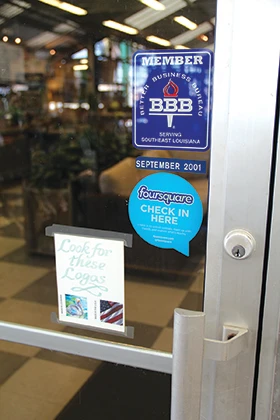
 When it comes to online reviews of local businesses, I typically hear one of two things from people in our industry: “I can’t stand those sites like Yelp, because people can write terrible reviews and it makes us look bad!” or “What do you mean I have a Yelp page? What is Yelp? I’ve never seen it!”
When it comes to online reviews of local businesses, I typically hear one of two things from people in our industry: “I can’t stand those sites like Yelp, because people can write terrible reviews and it makes us look bad!” or “What do you mean I have a Yelp page? What is Yelp? I’ve never seen it!”
If you’ve uttered something similar to either of these statements, then it might be time to admit you’re taking a backseat to your online reputation. This train has left the station, folks. You can either be the engineer or let people much less invested in your business drive the train for you.
These days, your online reputation should be a top priority to you and your business. Much like your website is your digital doorstep or storefront, online reviews now make up much of your word-of-mouth marketing. Whether the reviews are on Yelp, Angie’s List, Houzz, Facebook, Twitter or the like, you should be paying close attention to them.
You’re a customer, too
Think about how you shop as a customer: When you’re looking for products and services, don’t you usually want to get some feedback about the business first? Most of us jump online and investigate before we purchase. Marketing company Yodle states that 90 percent of customers are influenced by positive reviews online. One great review or one bad review can mean the difference between gaining those new customers and losing them before they’ve ever visited you.
While most people say they take these reviews about your business to heart, other research has found that only 28 percent of people actually write reviews. They’re often driven to write them after they’ve had a bad experience, not a good one. I can say that’s pretty accurate from my own shopping experience. So if you’re not paying attention, you could end up with a few negative reviews that seriously drive down your online reputation and new business.
Get your house in order
Before we get into the nitty gritty of how to manage online reviews, you need to get online and take account of your existing reputation. Have you searched for and found your Yelp page if it exists already? If not, you can create one. Realize that Yelp creates these pages and you may have had one for quite some time without your knowledge. You may even have several reviews there that you’ve never seen before. I’ve seen this scenario repeatedly. You can claim your page as the business owner and make the necessary updates to your logo, photos, description and contact info. Then immediately respond to any reviews that may already be present. I’ll address response protocol a bit later.
Check your Facebook page for any existing reviews and thank the customers. Also, always address any feedback, positive or negative on all of your social media platforms. If you advertise with Angie’s List, be sure you’re monitoring comments and feedback regularly. There are many other places reviews of your business can appear so general web searches for your business name with the word “reviews” are helpful.
Ask for reviews
While most industry chatter I hear about these kinds of online reviews is negative, I always recommend taking a positive approach to them. Don’t fear online reviews, ask for them. Here is sample terminology I use for my clients in their email communications and online:
 “Have you used our services? If you’ve had a great experience or think we need to step up our game, we’d love to hear from you. Feel free to post reviews, suggestions & comments on our Yelp page.” Be sure to link to any of the sites where you’d like customers to post a comment.
“Have you used our services? If you’ve had a great experience or think we need to step up our game, we’d love to hear from you. Feel free to post reviews, suggestions & comments on our Yelp page.” Be sure to link to any of the sites where you’d like customers to post a comment.
Asking for reviews is often the best way to get positive reviews. Remember, most people write reviews after they’ve had a negative experience. They just don’t think about going that extra step if they are content with your services. If they are happy with you, they may also be happy to honor a direct request from you to share those feelings with others online.
One note on requesting reviews — they must be authentic. Yelp will filter out reviews that appear to be false and most reviews from commenters that have never reviewed another business. Never write your own fake reviews. They’ll bust you.
Reviews also drive SEO. Meaning, the more reviews you receive online, the higher up you’ll appear in online search results.
Leave the bitter behind
While the negative reviews may be frustrating, you must look at each of them as an opportunity to show your character and build customer trust. Vitriol will get you nowhere when it comes to existing negative reviews.
Here’s the deal: You or your staff most likely did the thing to them they weren’t happy about. I’ve visited a few IGCs lately, and I left each one of them wanting to go online to write a negative review. When someone complains online you need to apologize and own it. Show them you care about their experience and you want to make it right. Offer them a store credit or gift card and invite them to come back and visit you again. Remember, everyone else is watching to see how you’ll respond and they’ll judge you accordingly.
In these situations, the recommendation is that you send a private message to the reviewer first to see if you can work things out with them behind the scenes. Make them feel acknowledged and see if you can get them to come back. Often, if you can make it right, they’ll post an updated and upgraded review. If they reject your offer, you can then very politely respond publically to the comment that you are sorry for the poor experience and outline the offer you gave them so that others can see you made a concerted effort.
In my experience, both in the business I’ve run and with clients, I’ve only seen one review online that was unjustifiably negative and slanderous. Even then, the customer was addressed politely. In that situation I dealt with Yelp through the proper channels to handle it and did have to block the user from social media accounts. But that’s one customer out of thousands.
Back away from the delete button!
Do not, I repeat, do not delete negative reviews or comments from your social media pages or blog. Your customers have a right to air their grievances and you’ve given them the platform on which to do so. You’ll make them even angrier by deleting it rather than publicly addressing it.
Remember, everyone else is watching. You’ll show far stronger character and empathy by politely acknowledging the comment and offering to make it right. Even after you’ve addressed it, don’t delete it. It should remain for others to see an example of how you handle customer issues.
Of course, this policy does not apply to comments and posts where foul language or threats have been made. Those customers will need to be banned from your accounts. Chances are you will never have that experience.
Share the good
Have you gotten great reviews from customers online? Be sure to share them! Good reviews are gold, and there’s no reason you can’t share them via your website, emails or social media platforms. Remember, your job is to inspire confidence in your customers.
The overall lesson is to take the reins when it comes to your online persona and reputation. Take the bad with the good and always keep your focus on what’s best for the customer. Do that and you’ll win the online review game.
Leslie owns Halleck Horticultural, LLC, through which she provides horticultural content marketing, social media management and strategy consulting for green industry businesses. www.lesliehalleck.com

Explore the June 2014 Issue
Check out more from this issue and find your next story to read.
Latest from Garden Center
- Terra Nova Nurseries introduces rust-free and disease-resistant heucherella
- John T. Nickel, founder of Greenleaf Nursery Co., passes away at 89
- Garden Media Group announces sixth annual Women in Horticulture Week
- Star Roses and Plants announces National Knock Out Rose Day
- The Growth Industry Episode 4: How federal budget cuts are affecting horticulture nonprofits
- Pennsylvania Horticultural Society shares top gardening trends from 2025 Philadelphia Flower Show
- California Spring Trials 2026 dates announced
- Les Evans promoted to DRAMMwater segment manager, Al Zylstra to retire





